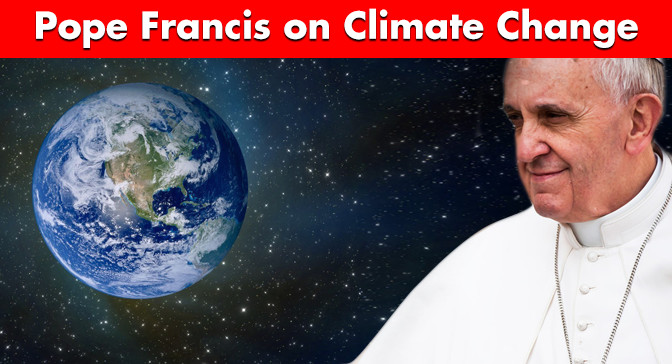Green Education and Legal Fund
by Mark Dunlea
The Pope’s urgent plea for global action to address the climate crisis recognizes that effective solutions will require a fundamental re-ordering of economic and political priorities, starting with addressing poverty, inequality and democracy.
His Encyclical – On Care for Our Common Home – reflects the call by climate justice advocates to make common cause with other movements for social, racial and economic justice.
The United State, as the major climate change contributor and denier, has led the effort for decades to block effective international remedies. Many hope that the Pope’s moral leadership will spur a broader and more powerful movement to demand change.
The Pope called for bold and immediate action. “Doomsday predictions can no longer be met with irony or disdain. We may well be leaving to coming generations debris, desolation and filth. The pace of consumption, waste and environmental change has so stretched the planet’s capacity that our contemporary lifestyle, unsustainable as it is, can only precipitate catastrophes…The effects of the present imbalance can only be reduced by our decisive action, here and now,”
While the Pope stopped just short of a formal rejection of capitalism, he repeatedly criticized the dominant economic and political focus on maximizing short-term profits and promoting overconsumption. “Economic powers continue to justify the current global system where priority tends to be given to speculation and the pursuit of financial gain.” He cited the need for models of economic cooperation rather than competition.
Recognizing that the power of corporations has grown too large for individual nation states to control, he called for devising “stronger and more efficiently organized international institutions…The same mindset which stands in the way of making radical decisions to reverse the trend of global warming also stands in the way of achieving the goal of eliminating poverty.”
He added that “we must forcefully reject the notion that our being created in God’s image and given dominion over the earth justifies absolute domination over other creatures. .. This responsibility for God’s earth means that human beings, endowed with intelligence, must respect the laws of nature and the delicate equilibria existing between the creatures of this world.” Human-driven climate change is already resulting in the sixth great extinction of species in the world’s history.
Pope Francis was dismissive of the current political leadership on climate change as too weak. “The alliance between the economy and technology ends up sidelining anything unrelated to its immediate interests. Consequently the most one can expect is superficial rhetoric, sporadic acts of philanthropy and perfunctory expressions of concern for the environment, whereas any genuine attempt by groups within society to introduce change is viewed as a nuisance based on romantic illusions or an obstacle to be circumvented.”
The Pope, a chemical engineer by training, was clear that the world’s richest countries had to do much more to assist the undeveloped world in responding to the climate crisis. “The countries which have benefited from a high degree of industrialization, at the cost of enormous emissions of greenhouse gases, have a greater responsibility for providing a solution to the problems they have caused…The developed countries ought to help pay this debt by significantly limiting their consumption of non-renewable energy and by assisting poorer countries to support policies and programmes of sustainable development.”
While many American political leaders (e.g., Republican contenders for the Presidency) often boast about their leadership in protecting “Christianity”, many did not hesitate to rush to reject the teachings of the major leader of the world’s Christians without bothering to study them. Granted, Christianity rivals Islam in the number of competing schisms but undoubtedly almost all leaders of major Christian denominations (as well as other religions) will embrace the Pope’s core message. It will be interesting to see how forcefully the major media outlets challenge this hypocrisy.
Many in the media were surprised that the Pope spoke specifically against the strategy of cap and trade (though some mistakenly sought to equate this with a tax on carbon or other greenhouse gas emissions). “The strategy of buying and selling ‘carbon credits’ can lead to a new form of speculation which would not help reduce the emission of polluting gases worldwide…In no way does it allow for the radical change which present circumstances require. Rather, it may simply become a ploy which permits maintaining the excessive consumption of some countries and sectors.”
Climate justice advocates have long pointed out the transition to 100% clean energy is the path to full employment, creating far more living wage jobs than continued reliance upon expensive fossil fuels. As usual, the question is whether the profits and political might of the fossil fuel companies will continue to take precedence over the well being of the rest of humanity.
The Pope’s answer on this question is quite clear. “Humanity is called to recognize the need for changes of lifestyle, production and consumption, in order to combat this warming or at least the human causes which produce or aggravate it.”
